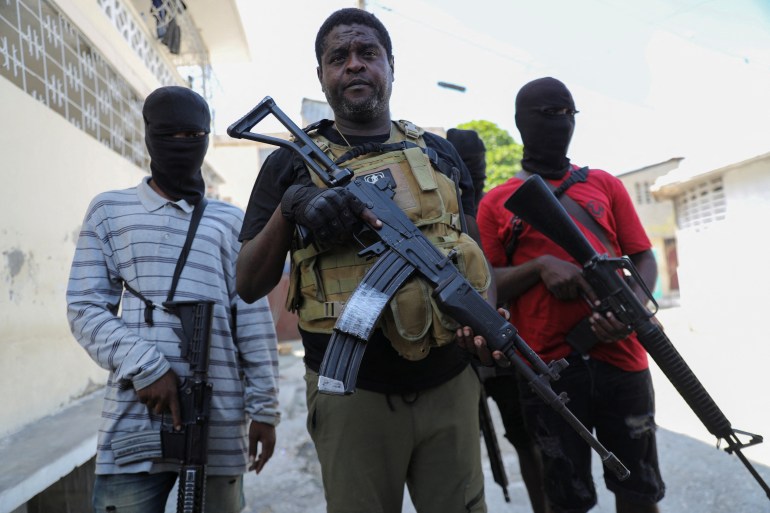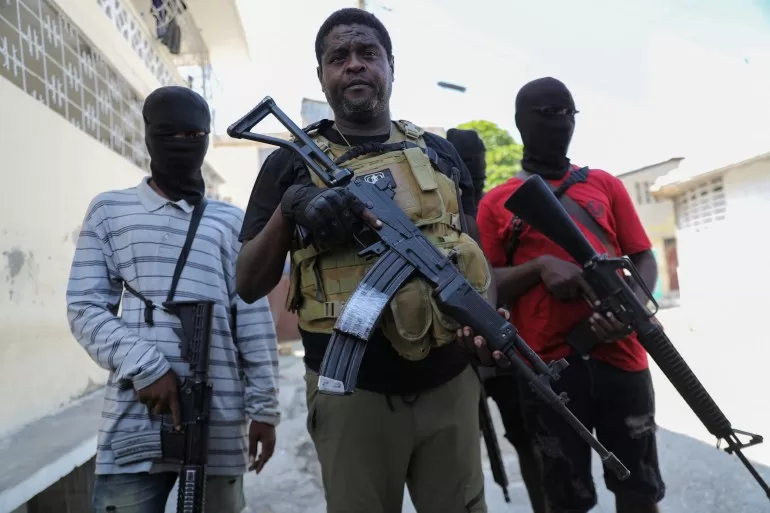During a news conference on Wednesday afternoon, US State Department spokesman Matthew Miller said Washington is “not calling on him [Henry] or pushing for him to resign”.
However, Miller told reporters that the US is urging Henry “to expedite the transition to an empowered and inclusive governance structure that will move with urgency to help the country prepare for a multinational security support mission”.
That mission, which has the backing of the United Nations but has been stalled for months, will then “address the security situation and pave the way for free and fair elections” in Haiti, Miller said.
His comments come after the Miami Herald reported early on Wednesday that the State Department had asked Henry to agree to a new transitional government and resign amid the growing crisis in Haiti.
A surge in gang violence that began at the weekend — and included attacks on police stations and raids on two prisons in the capital of Port-au-Prince — has displaced tens of thousands of people and effectively paralysed the city.
A 74-year-old neurosurgeon, Henry was sworn in as Haiti’s prime minister in July 2021, less than two weeks after President Jovenel Moise was assassinated. Moise had chosen Henry for the post shortly before he was killed.
The assassination worsened months of political instability in Haiti, and gang violence soared in the resulting power vacuum.
Meanwhile, Henry — who long enjoyed the backing of the US and other Western powers, including the so-called Core Group of nations — faced a crisis of legitimacy from the very start of his tenure.
Some Haitian civil society groups had urged him to hand power over to an inclusive, transitional government, a move they argued would help stem the gang violence and widespread insecurity plaguing the country.
Henry rejected that demand, but said he was seeking unity and dialogue. He also repeatedly said that elections could not be held until it is safe to do so.
But that angered many people across Haiti, including armed gang leaders who over the past few years have used pressure tactics – including fuel terminal blockades – in an effort to force him to resign.
Current crisis
The situation escalated when Henry left Haiti last month to attend a four-day summit in the South American country of Guyana organised by a regional trade bloc known as the Caribbean Community and Common Market (CARICOM).
While Henry did not speak to the media, Caribbean leaders said that he promised to hold elections in mid-2025. A day later, coordinated gang attacks began in Haiti’s capital and beyond.
Henry then departed Guyana for Kenya last week to meet with President William Ruto and to push for the UN-backed deployment of a Kenyan police force, which a court in the East African country ruled was unconstitutional.
Officials never said when the prime minister was due back in Haiti following his Kenya trip, and his whereabouts were unknown for several days until he unexpectedly landed in Puerto Rico on Tuesday.
In the meantime, the Haitian government declared a state of emergency and imposed a curfew as the country’s already overwhelmed and ill-equipped police force tried to stem the surge in gang violence.

Schools and shops have closed in Port-au-Prince — where gangs are believed to control about 80 percent of the city — and 15,000 Haitians have been forced to flee their homes in recent days, according to the UN Office for the Coordination of Humanitarian Affairs (OCHA).
The head of a powerful Haitian gang alliance known as G9, Jimmy “Barbecue” Cherizier, also warned that “if Ariel Henry doesn’t resign, if the international community continues to support him, we’ll be heading straight for a civil war that will lead to genocide”.
‘No quick fix’
The UN Security Council was scheduled to hold a closed-door meeting on Haiti on Wednesday afternoon “to discuss the alarming escalation of gang violence”, a spokesman for UN Secretary-General Antonio Guterres told reporters.
“The situation in Port-au-Prince remains extremely fragile as sporadic attacks have continued and all flights in and out of Haiti remain cancelled,” Stephane Dujarric said.
Speaking at UN headquarters in New York earlier in the day, US Ambassador Linda Thomas-Greenfield echoed Miller at the State Department when she was asked if Washington had urged Henry to step down.
“What we’ve asked the Haitian prime minister to do is move forward on a political process that will lead to the establishment of a presidential transitional council” to allow for elections, Thomas-Greenfield told reporters.
“We think that it’s urgent … that he moves forward in that direction and start the process of bringing normalcy back to the people of Haiti.”
Jake Johnston, a senior research associate at the Center for Economic and Policy Research in Washington, DC, and expert on Haiti, said it is “no surprise” that the US government is denying reports that it is asking Henry to resign.
#Haiti.-There is no quick fix for such a profound and protracted crisis. Picking another “puppet” won’t help. It’s urgent to act to save lives, protect the population, restore peace, and reinstate democratic order. This necessitates addressing not only the activities of gangs but… pic.twitter.com/v4pE1jKMjH
— Emmanuela Douyon 杜鳶 🇭🇹 (@emmadouyon) March 6, 2024
“But what they are saying they are asking Henry to do is likely to result in his resignation, because nobody is making a political deal that keeps him in power,” Johnston wrote on X.
Emmanuela Douyon, a Haitian rights advocate and analyst, also wrote in a social media post that “there is no quick fix for such a profound and protracted crisis”.
“It’s urgent to act to save lives, protect the population, restore peace, and reinstate democratic order. This necessitates addressing not only the activities of gangs but also tackling corruption and criminal activities, including collusion with gangs within political and economic elites,” she said.
“To guide this process efficiently and keep it as short as possible, we need capable and credible leaders, some political consensus, and a significant amount of political will. It is imperative to ensure that forthcoming elections are inclusive, free, fair, and credible.”
